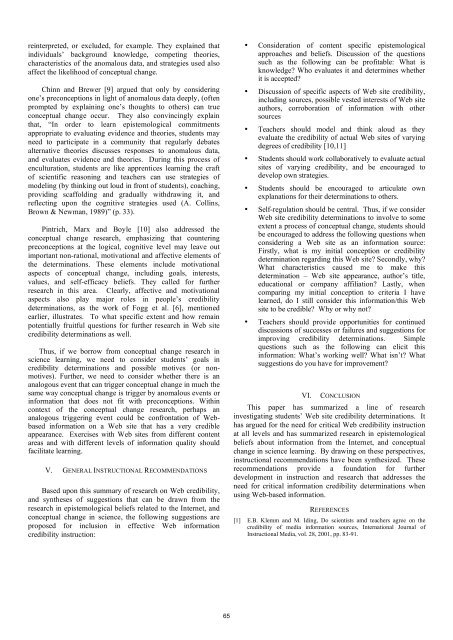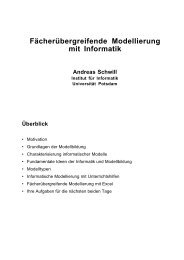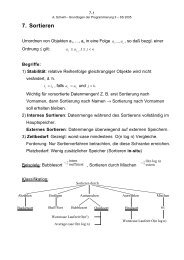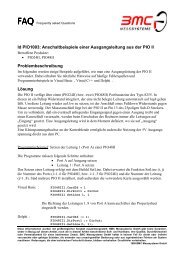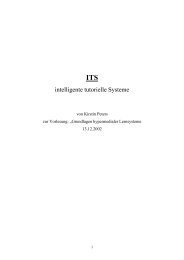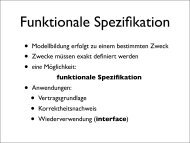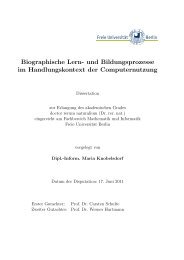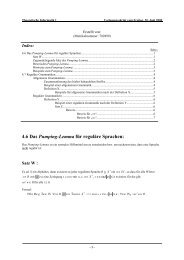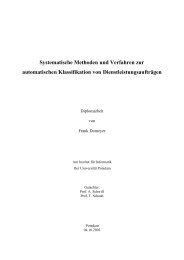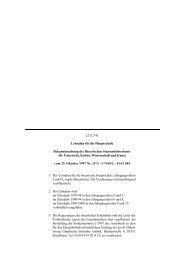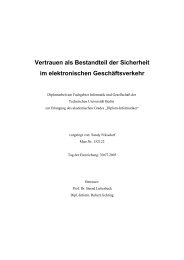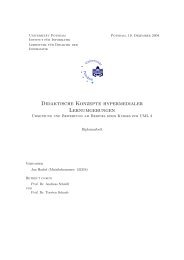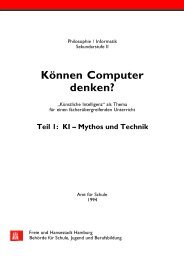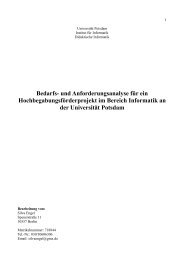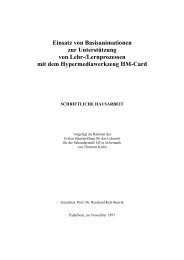Maria Knobelsdorf, University of Dortmund, Germany - Didaktik der ...
Maria Knobelsdorf, University of Dortmund, Germany - Didaktik der ...
Maria Knobelsdorf, University of Dortmund, Germany - Didaktik der ...
Create successful ePaper yourself
Turn your PDF publications into a flip-book with our unique Google optimized e-Paper software.
einterpreted, or excluded, for example. They explained that<br />
individuals’ background knowledge, competing theories,<br />
characteristics <strong>of</strong> the anomalous data, and strategies used also<br />
affect the likelihood <strong>of</strong> conceptual change.<br />
Chinn and Brewer [9] argued that only by consi<strong>der</strong>ing<br />
one’s preconceptions in light <strong>of</strong> anomalous data deeply, (<strong>of</strong>ten<br />
prompted by explaining one’s thoughts to others) can true<br />
conceptual change occur. They also convincingly explain<br />
that, “In or<strong>der</strong> to learn epistemological commitments<br />
appropriate to evaluating evidence and theories, students may<br />
need to participate in a community that regularly debates<br />
alternative theories discusses responses to anomalous data,<br />
and evaluates evidence and theories. During this process <strong>of</strong><br />
enculturation, students are like apprentices learning the craft<br />
<strong>of</strong> scientific reasoning and teachers can use strategies <strong>of</strong><br />
modeling (by thinking out loud in front <strong>of</strong> students), coaching,<br />
providing scaffolding and gradually withdrawing it, and<br />
reflecting upon the cognitive strategies used (A. Collins,<br />
Brown & Newman, 1989)” (p. 33).<br />
Pintrich, Marx and Boyle [10] also addressed the<br />
conceptual change research, emphasizing that countering<br />
preconceptions at the logical, cognitive level may leave out<br />
important non-rational, motivational and affective elements <strong>of</strong><br />
the determinations. These elements include motivational<br />
aspects <strong>of</strong> conceptual change, including goals, interests,<br />
values, and self-efficacy beliefs. They called for further<br />
research in this area. Clearly, affective and motivational<br />
aspects also play major roles in people’s credibility<br />
determinations, as the work <strong>of</strong> Fogg et al. [6], mentioned<br />
earlier, illustrates. To what specific extent and how remain<br />
potentially fruitful questions for further research in Web site<br />
credibility determinations as well.<br />
Thus, if we borrow from conceptual change research in<br />
science learning, we need to consi<strong>der</strong> students’ goals in<br />
credibility determinations and possible motives (or nonmotives).<br />
Further, we need to consi<strong>der</strong> whether there is an<br />
analogous event that can trigger conceptual change in much the<br />
same way conceptual change is trigger by anomalous events or<br />
information that does not fit with preconceptions. Within<br />
context <strong>of</strong> the conceptual change research, perhaps an<br />
analogous triggering event could be confrontation <strong>of</strong> Webbased<br />
information on a Web site that has a very credible<br />
appearance. Exercises with Web sites from different content<br />
areas and with different levels <strong>of</strong> information quality should<br />
facilitate learning.<br />
V. GENERAL INSTRUCTIONAL RECOMMENDATIONS<br />
Based upon this summary <strong>of</strong> research on Web credibility,<br />
and syntheses <strong>of</strong> suggestions that can be drawn from the<br />
research in epistemological beliefs related to the Internet, and<br />
conceptual change in science, the following suggestions are<br />
proposed for inclusion in effective Web information<br />
credibility instruction:<br />
65<br />
• Consi<strong>der</strong>ation <strong>of</strong> content specific epistemological<br />
approaches and beliefs. Discussion <strong>of</strong> the questions<br />
such as the following can be pr<strong>of</strong>itable: What is<br />
knowledge? Who evaluates it and determines whether<br />
it is accepted?<br />
• Discussion <strong>of</strong> specific aspects <strong>of</strong> Web site credibility,<br />
including sources, possible vested interests <strong>of</strong> Web site<br />
authors, corroboration <strong>of</strong> information with other<br />
sources<br />
• Teachers should model and think aloud as they<br />
evaluate the credibility <strong>of</strong> actual Web sites <strong>of</strong> varying<br />
degrees <strong>of</strong> credibility [10,11]<br />
• Students should work collaboratively to evaluate actual<br />
sites <strong>of</strong> varying credibility, and be encouraged to<br />
develop own strategies.<br />
• Students should be encouraged to articulate own<br />
explanations for their determinations to others.<br />
• Self-regulation should be central. Thus, if we consi<strong>der</strong><br />
Web site credibility determinations to involve to some<br />
extent a process <strong>of</strong> conceptual change, students should<br />
be encouraged to address the following questions when<br />
consi<strong>der</strong>ing a Web site as an information source:<br />
Firstly, what is my initial conception or credibility<br />
determination regarding this Web site? Secondly, why?<br />
What characteristics caused me to make this<br />
determination – Web site appearance, author’s title,<br />
educational or company affiliation? Lastly, when<br />
comparing my initial conception to criteria I have<br />
learned, do I still consi<strong>der</strong> this information/this Web<br />
site to be credible? Why or why not?<br />
• Teachers should provide opportunities for continued<br />
discussions <strong>of</strong> successes or failures and suggestions for<br />
improving credibility determinations. Simple<br />
questions such as the following can elicit this<br />
information: What’s working well? What isn’t? What<br />
suggestions do you have for improvement?<br />
VI. CONCLUSION<br />
This paper has summarized a line <strong>of</strong> research<br />
investigating students’ Web site credibility determinations. It<br />
has argued for the need for critical Web credibility instruction<br />
at all levels and has summarized research in epistemological<br />
beliefs about information from the Internet, and conceptual<br />
change in science learning. By drawing on these perspectives,<br />
instructional recommendations have been synthesized. These<br />
recommendations provide a foundation for further<br />
development in instruction and research that addresses the<br />
need for critical information credibility determinations when<br />
using Web-based information.<br />
REFERENCES<br />
[1] E.B. Klemm and M. Iding, Do scientists amd teachers agree on the<br />
credibility <strong>of</strong> media information sources, International Journal <strong>of</strong><br />
Instructional Media, vol. 28, 2001, pp. 83-91.


